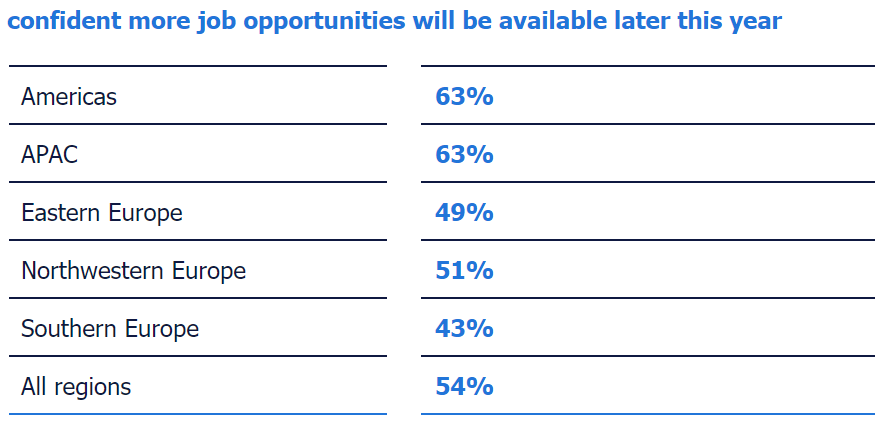A global workforce — fatigued by restrictions and safety concerns — is emerging in 2021 with a more optimistic and hopeful outlook for the year ahead, the latest Randstad Workmonitor research has revealed. Conducted in the first quarter of 2021, this semi-annual survey of more than 27,000 workers in 34 markets showed that workers around the world are ready to go back to their workplace and more than willing to receive the vaccine if required by their employer.
There is also a new optimism that additional job opportunities will emerge later in the year, contrasting with results from last year in which negative sentiments weighed heavily on most respondents around the world. Key findings include:
- 78% want to go back to the workplace at least partially if not full-time.
- 75% would be willing to get vaccinated if it’s required for their job.
- 54% think they will have more job opportunities this year.
- 52% say their experience with work during the pandemic has motivated them to stay with their employer for the long term.
A role for business in vaccination rollout
For organizations to return to a pre-pandemic state, most survey respondents believe their work environments need to also be much safer than they are now and an increase in vaccination rollout is seen by many as essential. In fact, 53% of workers say they won’t feel safe in the workplace until others around them are vaccinated, and 51% prefer to work from home until the vaccine is widely distributed.
Our survey revealed that just a quarter of workers are required by their employer to be vaccinated, with the highest percentage located in Asia and the lowest in Southern Europe. However, an overwhelming majority (75%) of respondents say they would be willing to get vaccinated if required for their job and more than half (56%) believe they will have more job opportunities once vaccinated. This indicates a strong role for business at a critical time in the global vaccination rollout.
Strong desire to return to the workplace
Until a return to work is possible, feelings of isolation, the inability to strike a healthy work-life balance and the longing for personal connections are concerns cited by a majority of workers. Indeed, 52% mention missing in-person interaction with colleagues, and more than one-third of those 18 to 24 years old feel lonely — the highest percentage among all age groups. These challenges have created a strong desire to return to the office (78%), however not necessarily in the same way as before the pandemic. 54% of respondents enjoy a hybrid work environment where they are in charge of choosing their workplace.
Anticipating what workers will need over the next months, pivoting with public health guidelines and planning for more reopenings will require employers to adapt quickly to ensure workers feel supported through the transition. The most useful action cited by over a quarter of respondents (27%) is that organizations need to strengthen their policies to help workers maintain a proper work-life balance.
Optimism for the future
The data reveals that after a year of restrictions and lockdowns, the global workforce has grown accustomed to these conditions, and they are more hopeful about the months ahead. A majority (54%) responded that they anticipate a better jobs market; however, just as they have been adversely affected throughout the pandemic, women are generally less hopeful about the jobs market.

Although optimistic about future job opportunities, 52% of respondents say their experience with work during the pandemic has motivated them to stay with their employer for the long term,” said Marc-Etienne Julien, CEO, Randstad Canada & Managing Director, Global Talent. “In fact, around 30% said the experience they’ve had with their employer during the past year has spurred them to be more productive. “To help employers instill greater confidence around wellness and safety, C-suite and human capital leaders need to map what a post-pandemic work environment looks like — whether that means hybrid schedules to maintain distancing in the office, incentive programs to encourage widespread vaccination or more employee assistance programs offering a variety of support mechanisms. Even when most of the global workforce is inoculated, it will take time for the workforce to acclimate to so much change ahead.”
You can read more detailed insights in the full report which can be downloaded from: https://www.randstad.com/workforce-insights/global-hr-research/randstad-workmonitor/
Thanks for reading CPA Practice Advisor!
Subscribe Already registered? Log In
Need more information? Read the FAQs




